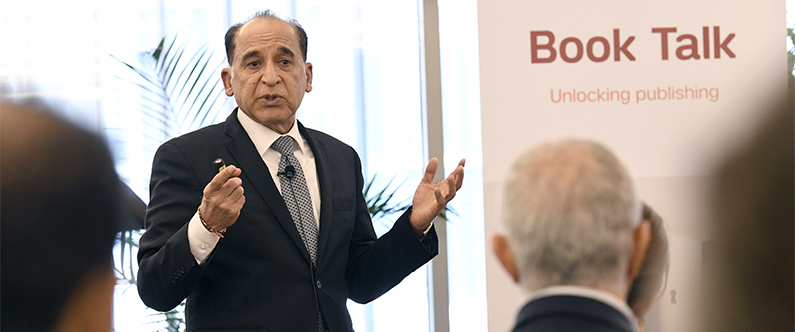A journey through publishing
 Dr. Ravinder Mamtani spoke about his experiences in publishing at a Book Talk event hosted by WCM-Q's Distributed eLibrary.
Dr. Ravinder Mamtani spoke about his experiences in publishing at a Book Talk event hosted by WCM-Q's Distributed eLibrary.
Dr. Ravinder Mamtani, a leading proponent of lifestyle medicine, spoke about the importance of effective communication in the healthcare sphere at an event hosted by the Distributed eLibrary at WCM-Q.
Dr. Mamtani was speaking at the latest in the series of Book Talks, which allow published authors to share their experiences with members of the community, particularly those with an interest in academic publishing. He discussed his experiences of writing research articles, writing and editing academic books, and penning healthcare columns for mainstream audiences in the Poughkeepsie Journal in New York (a Gannett publication) and national newspapers in Qatar.
Dr. Mamtani, professor of healthcare policy and research and professor of medicine at WCM-Q, said the best advice he ever received as a writer was to keep things simple, especially when writing about healthcare issues for audiences without medical expertise. He said: “I worked with a wonderful editor who told me to write as if I were addressing an 8th grader - not in order to talk down to the audience, but in order to reach the broadest audience possible. And she was completely right - the goal with a health column should be provide useful information to as many people as possible, not to demonstrate how learned you are by using specialist terms.”
Dr. Mamtani explained that this advice is particularly pertinent in the fields of population health, preventive and lifestyle medicine, which often rely on the communication of health advice to large audiences, but that it is also applicable to writing teaching materials.
He said: “I have learned from teaching that if I attempt to communicate something to someone and they don’t understand me, that is my failure, not theirs. The art is to be able to communicate complex information in simple terms without losing meaning. I try to keep that in mind whenever I sit down to write or speak in public forums.”
In addition to his newspaper columns, Dr. Mamtani has published extensively in leading international medical journals, contributed chapters to numerous academic texts and co-edited two books, the first titled Complementary and Integrative Medicine in Pain Management and the second, published in 2017, titled Critical Issues in Healthcare Policy and Politics in the Gulf Cooperation Council States.
Dr. Mamtani, who is also vice dean for student affairs-admissions, population health and lifestyle medicine, said that doctors who write should feel comfortable taking advice from professional editors and publishers. “I learned that while writing is frequently a solitary task, publishing is a team effort,” he said. “Let your work benefit from the expertise of publishing professionals so that your words reach the maximum number of people and cause the maximum benefit possible.”